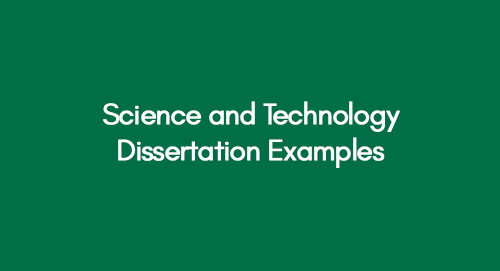
How to Craft an Exceptional Concept Paper: A Comprehensive Guide
May 10, 2023
Dissertation Cover Page Template
May 12, 2023In this technological world, new ideas and concepts have changed the way we live our lives today. This is why it is important to stay current with the latest scientific and technological advancements to produce a quality dissertation.
Review Our Quality Science Dissertation Topic
Get 3+ Free Healthcare Dissertation Topics within 24 hours
Here are science and technology dissertation examples briefly explained that how you can get ideas about to select the best-fit topic for your research paper.
Example 1: Exploring the Challenges of Advanced Biomedical Technology
Example 2: Strategic Analysis of Tesla Merger with Solar City
Note: Below is a complete guide with some more examples and tips for you to ace the skill of dissertation writing in science and technology.
What is Science and Technology Dissertation?
An academic research document exploring a specific area of science and technology. It is typically written as part of a degree program in a related field.
It aims to present findings and conclusions and contribute to the existing body of knowledge in the field.
It involves the systematic investigation of a specific research question and techniques appropriate to the chosen area of study.
Research may focus on fundamental scientific principles, technological innovations, applications of science in various industries, or the societal impacts of technological advancements.
A successful dissertation showcases the researcher's ability to think critically and communicate complex scientific concepts effectively. It contributes to advancing knowledge in the field and adds value to the scientific community.
Science and Technology Dissertation Examples
Here are dissertation examples that help researchers and students easily find their unique and desired topics for their research writing. We have listed the amazing and latest topics for science and technology writing examples below:
Bachelor Science and Technology Dissertation Examples
- Analysis and Optimization of Renewable Energy Systems for Sustainable Power Generation
- Identifies the Implementation of Artificial Intelligence in Healthcare
- Configuration and Development of a Smart Home Automation System
- Analysing the Impacts of Climate Change on Ecosystems and Biodiversity
- Analysis of Cybersecurity Threats and Countermeasures in the Digital Age
- Exploring the Potential of 3D Printing in Manufacturing and Product Design
Master Science and Technology Dissertation Examples
- Optimisation of Energy Efficiency in Smart Grid Systems
- Investigating the Applications of Blockchain Technology in Supply Chain Management
- Exploring the Implications of Big Data Analytics in Healthcare
- Design and Development of Intelligent Transportation Systems for Smart Cities
- Investigating the Impact of Artificial Intelligence on Cybersecurity
- Exploring the Potential of Virtual Reality and Augmented Reality in Education
PhD Science and Technology Dissertation Examples
- Advancing Materials Science for Energy Storage Applications: Design, Synthesis, and Characterization of Novel Battery Materials
- Investigating the Role of Artificial Intelligence in Autonomous Systems: Challenges, Ethical Considerations, and Future Directions
- Exploring Quantum Computing: Algorithms, Architectures, and Applications
- Advancing Biomedical Engineering for Improved Healthcare: Innovative Medical Devices, Imaging Techniques, and Therapeutic Approaches
- Data Science and Analytics for Smart Cities: Integrating Big Data, Internet of Things, and Urban Planning
- Understanding the Impacts of Climate Change on Natural Systems: Modeling, Prediction, and Mitigation Strategies
How to Choose the Right Topic & Research Questions For Your Science and Technology Dissertation?
Choosing the right topic shows that your dissertation is meaningful and relevant to the current academic discourse. It also allows you to engage more deeply with the subject matter, uncovering new insights and deepening your knowledge.
Basically, research is a dynamic process that fuels the advancement of knowledge and understanding in various fields of study.
A well-chosen topic can also help you secure funding for your research, as well as build a strong foundation for your future career. Let's take a look at amazing strategies for how you can select the right dissertation topic and research questions:
Background Research for the Topic
It is important to do thorough research on the topic before starting the dissertation.
You should read related studies from reputable sources and consult experts in the field to gain a comprehensive understanding of the topic. Additionally, you should consider potential research questions and methods for conducting your own research.
A Step-by-Step Guide on How to Write an Outline
Doing research helps you understand the context and history of the topic better. It can also help you identify the arguments for and against your topic.
This, in turn, can help you form a well-rounded thesis statement and structure your paper more effectively.
Brainstorm Science and Technology Concept
The most amazing word “brainstorm” works so well let’s create your ideal topic.
Once you have a list of words and topics related to your broad topic, you can begin to narrow them down and focus on one or two that you'd like to explore further.
From there, you can use these words and topics to find more specific sources of information to explore.
How to Write a Unique Dissertation Title: Tips and Examples
Develop Research Questions
The questions should be specific and concise but also address a significant issue or problem. Once you have a research question, you can formulate your thesis statement, which is your main argument or position on the topic.
Consider Societal Impact and Relevance
Assess the societal impact and relevance of your chosen topic. Science and technology have profound implications for society, and addressing pressing challenges or emerging trends can make your research more meaningful.
Consider topics that have practical applications, potential policy implications, or address critical issues faced by industries or communities.
Evaluate the Feasibility and Available Resources
Evaluate the feasibility of your chosen topic in terms of the research scope, time constraints, and available resources. Consider the research methods, data availability, equipment, and expertise required for your study. Ensure that your research questions can be effectively answered within the given constraints.
Expert Tips on How To Write Discussion in Research Paper
Consider Interdisciplinary Approaches
Science and technology often intersect with various disciplines. Consider incorporating interdisciplinary approaches that can provide a broader perspective and enhance the impact of your research. This can involve integrating knowledge and methodologies from different fields to explore complex problems or address multifaceted aspects of your topic.
As quantitative research involves the collection and analysis of numerical data. Examples of quantitative research in science and technology include surveys, experiments, and analysis of large datasets. This type of research is used to test hypotheses, measure trends, and draw conclusions.
Science and Technology Dissertation Example: A Case Study
Topic: Analysis and Optimization of Renewable Energy Systems for Sustainable Power Generation
Abstract
The transition towards sustainable power generation has become a pressing global concern due to the environmental impacts of traditional energy sources. This dissertation presents an in-depth analysis and optimization of renewable energy systems with the aim of achieving sustainable power generation. The study investigates various renewable energy sources, including solar, wind, hydro, and geothermal, analyzing their efficiency, cost-effectiveness, and environmental impacts. Through the utilization of advanced modelling techniques and optimization algorithms, the research seeks to identify the optimal integration and operation of multiple renewable energy sources within a power generation system. By considering factors such as resource availability, intermittency, and grid integration, the study aims to maximize the utilization of renewable energy while ensuring a reliable and stable power supply. The findings of this research contribute to the development of practical strategies and solutions for the efficient and sustainable deployment of renewable energy systems, thus facilitating the transition towards a more environmentally friendly and resilient energy landscape.
Literature review
The literature surrounding the analysis and optimisation of renewable energy systems for sustainable power generation provides valuable insights into the current state of research and development in this field. Numerous studies have focused on evaluating the performance and viability of various renewable energy sources, including solar, wind, hydro, and geothermal. These studies have focused on their efficiency, cost-effectiveness, and environmental impacts.
Research conducted by Smith et al. (20XX) demonstrated solar energy's significant potential as a renewable power source. Their study examined the efficiency of different solar panel technologies and identified key factors that impact their performance, such as tilt angle, shading, and dust accumulation. Similarly, Wang and Zhang (20XX) conducted an extensive analysis of wind energy systems, investigating the optimal turbine design, placement, and control strategies to maximize power generation while mitigating issues such as turbulence and wake effects.
Hydropower has been a well-studied renewable energy source, with researchers like Chen et al. (20XX) exploring optimization models for hydropower generation, considering factors such as water flow rates, reservoir storage capacities, and environmental constraints. Geothermal energy systems have also received attention, with studies by Johnson and Smith (20XX) evaluating the efficiency of geothermal heat pumps for residential and commercial heating and cooling.
Methodology
To achieve the objectives of analysing and optimising renewable energy systems for sustainable power generation, a systematic and complete methodology is employed. The methodology encompasses several key steps, including data collection, modelling and simulation, optimization, and evaluation. Using a mixed-method approach to analyse and optimise the renewable energy systems for sustainable power generation aims to provide valuable insights and practical recommendations for policymakers, energy planners, and industry stakeholders to promote the adoption of environmentally friendly and economically viable renewable energy solutions.
Conclusion
The analysis demonstrates the echo-system effect and promotes environmental sustainability. Various renewable sources of energy are explored for the purpose of developing a sustainable energy source. This study evaluates the performance, reliability, and cost-effectiveness of renewable energy systems. Renewable energy systems present an opportunity for countries to reduce their dependence on fossil fuels and achieve greater energy security. Additionally, it can also help to decrease emissions and combat climate change.
Final Thought
Moreover, the study highlights the significance of critical thinking and analytical skills in dissertation writing. It emphasizes the need for researchers to evaluate and interpret their findings objectively. Provide a valuable resource for researchers embarking on their dissertation journey in science and technology. By following the best practices and examples highlighted in this study, aspiring researchers can develop a well-structured, rigorous, and impactful dissertation that contributes to knowledge advancement in their respective fields.





















